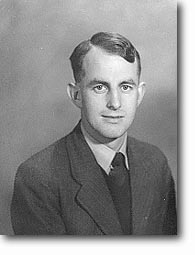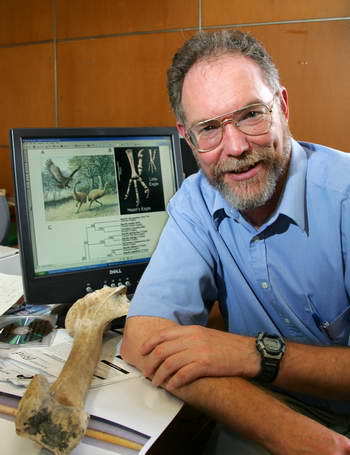Ian Dixon – 28/01/01
The video about the 1951 Waterside Lockout shown on television recently was accurate, but did not contain information about the church point of view. Michael Bassett’s book does not contain it either. The Reverend Ian Dixon tells in this interview about an aspect of the activities in Wellington that has not previously been recorded.
|
|
| The Rev Ian Dixon in 1951 Photo source Ian Dixon |
At first I was not involved to any extent in activity related to the strike until I realised how many watersiders and people involved in the strike were in my parish at St Columba’s Presbyterian Church, Naenae, Lower Hutt.
The person who alerted me to full consciousness of it was Lloyd Geering who was minister of St James in Newtown, a parish not unlike mine. He had quite a number of watersiders in his parish and he started to make contact with the people at the Trades Hall and get day to day accounts live and passed them on to me.
I became seriously concerned when the State of Emergency was declared by the Holland National Government because it meant that you were not allowed to assist the strikers in any way whatever and you were not even allowed to talk about the issue. This prohibition led to some extraordinary situations. I heard some time later that two people standing on a street corner were told by the police to move on, though the policeman had no idea what they were talking about.
There was almost a complete blackout in the press. I contacted Walter Nash who was my Member of Parliament for the Hutt electorate at that time. I told him that there were people involved in the strike who belonged to my congregation.
We made inquiries in the parish and found that for them there was actual hardship. The Session of the Naenae parish began to collect food and amassed quite a large amount. We regularly made up parcels of basic items and left them on people’s front doorsteps late at night as we did not want people to feel that they were being seen to receive charity.
We collected some money so that when we found instances of real distress over matters other than food we had a fund that we were able to divide up. The ten men on what I remember as a wonderful Session (the governing body within the parish) all worked with me as a harmonious team and we all gave money to the treasurer so that he could write out cheques for people in need in an unofficial way. The whole process was very informal. Later when the strike was over Walter Nash asked me how much money I had personally given away and insisted on refunding some of it to me.
Walter Nash and I were in almost daily contact and because of the bulletins I received from the Trade Unions through Lloyd Geering I got quite frequent visits from either Barnes or Hill, the strike leaders. We seemed to be the only ones outside the unions who were taking a practical concern and they were bringing out a weekly bulletin of their own. They supplied me with copies of that bulletin, but at one stage it became absolutely scurrilous. We were on the side of the watersiders because the State of Emergency was so dire, but when they started making abusive statements about the government that were not correct, we were unhappy about it. I remember when Barnes and Hill were both in my study one day I said to them, “In this bulletin you people must tell the truth ALWAYS. If you don’t tell the truth I’m not going to accept the misstatements that you make and I’m not going to take part with you in this struggle.” Lloyd Geering supported me in this stand. Our opposition to what they were writing made them alter their style.
At one critical point in the struggle I invited any of the strikers who were interested to attend an evening service in St Columba’s church in Naenae. The church was packed. I preached a sermon on “Justice and the State of Emergency”. I showed that I was very much on the strikers’ side, but I also said, “You people have got to play the game yourselves, and there are some things that I am not satisfied about. You people need to pull up your socks and we must all at all times tell the truth. You will come out of this honourably if you know that your cause is just.” I remember that the final hymn, which included the line “Cleanse the body of this empire by the healing of thy word.” The men, many of whom I had never seen before, sang lustily which surprised me as I was unsure whether they knew the tune. Some of the men had tears running down their cheeks as they sang.
When the service ended the men sat on in the church and I went back to the manse. Then someone came over and said that the strikers were all standing outside the church and waiting for me to go and answer some questions they wanted to ask, so we talked about the issues that were concerning me and then they left.
My criticism of the State of Emergency meant that more than once I was warned to be careful or I would be put in gaol for having broken the law by discussing the issues.
My daughter, Judy, remembers my saying to the family, “At the present time I am breaking the law. We shouldn’t break the law, except if you think that the law is unjust and wrong. I might get into trouble, and I might even get arrested for what I am doing and the meetings I am holding. We are trying to help the people who haven’t got enough to eat. Don’t get too worried about it, because if I do get into trouble it won’t last for very long. They might put me in gaol for a week or two, but it would not be more serious than that.”
The issue of the strike seemed to take up all my time in the following days. The congregation accepted that on Sunday mornings my sermons would be about the government’s actions and limitation of freedom and everyone gave me 100% support.
One night my wife Brenda and I had gone to bed but I got up in my dressing gown to attend to one of the children who was having a bad dream. Then at 11.45 the front door bell rang. I opened the door and there was my entire Session standing outside. They said, “We’ve got to have a Session meeting – right now!” There was such a rapport between us that I never questioned their decision about this and we gathered in the drawing room and Brenda made a cup of tea.
One of the Session members was the local policeman and he had warned me about the risks I was taking in speaking openly about the strike issues. I was aware that the strikers were going to march on Parliament before the end of the week. The policeman had heard that day that when the march reached the corner of Willis Street and Lambton Quay the mounted police were to ride into them with batons drawn. This would clearly lead to bloodshed. He shared his concern with another Session member and eventually all the men on Session met and discussed what should be done. One suggestion was that I should lead the march in my clerical collar which would stop the mounted police from attacking. I said that I was not ready for martyrdom and anyway I did not believe that strategy would work and suggested instead that the Presbytery should go into an urgent meeting. With the agreement of the group I went to the phone and got the Moderator out of bed about 1 am to acquaint him with the urgency of the situation. Eventually the Presbytery met a day later at St Andrew’s on the Terrace.
The minister of St Andrew’s, the Rev Jack Somerville, who was in regular contact with me suggested that the Minister of Labour, Bill Sullivan, who was a member of his church, be invited to the Presbytery meeting and advise us on what action we could take. He listened to Presbytery’s deep concern about the State of Emergency and the way events were shaping. Then he suggested that we send a delegation to the Prime Minister from this meeting expressing our concern about the continuation of the State of Emergency and saying it must be lifted before anything worthwhile could happen. He offered to arrange the meeting straightaway.
Presbytery appointed three people to the delegation – the Rev. Jack Somerville, a lay representative and me. We went straight to Parliament Buildings and in a short time were ushered into the presence of the Rt. Honourable Mr Sidney Holland, the Prime Minister. When we were introduced to him he turned on a rage saying, “How do you parsons think that you can do anything to solve a dispute like this?”
Jack Somerville replied, ” We haven’t come with the intention of solving the dispute. We have really come to express our concern and to offer our goodwill and our services to you.”
Despite this the tirade lasted interminably. He called us names and said that we ought to be teaching our people to observe the Sermon on the Mount and that maybe the best thing would be for the three of us to get on the first boat to Soviet Russia. It was incoherent rage. However after twenty to thirty minutes he asked what we wanted to say.
I repeated what Jack Somerville had said about offering our services. “We believe that the country is in a state of grave emergency. We don’t pretend to come as industrial conciliators, but we are prepared to do anything to help. The Presbytery is unanimous in believing that the State of Emergency should be lifted as it was a serious obstacle to any solution to the situation.
The Prime Minister replied that I didn’t know what I was talking about and as a young man I might learn more wisdom as I got older. “You parsons have your spiritual job to do and should leave the strike to us,” he said.
I expressed our gratitude that we had been able to make this point to him and we were ushered out of the room. We felt that the situation had been hopeless, but Bill Sullivan assured us that we had all done very well. “The Prime Minister needed to hear that,” he said, “and he needed to hear it from people like you. He will have listened to you as he has not listened to other people.”
Two days later the State of Emergency was lifted.
Was our delegation influential? Who knows?
The strike was over in a few days. As far as the watersiders were concerned the settlement was a poor one, but the crisis was over.
The march we feared did not take place.
And all this happened because ten elders had a meeting at midnight with Brenda and me in our dressing gowns and Brenda serving tea.
Click here to read another article from Ian Dixon.



